The 14 Unwritten Rules Of Cruise Travel—And 3 That Could Make Or Break Your Trip
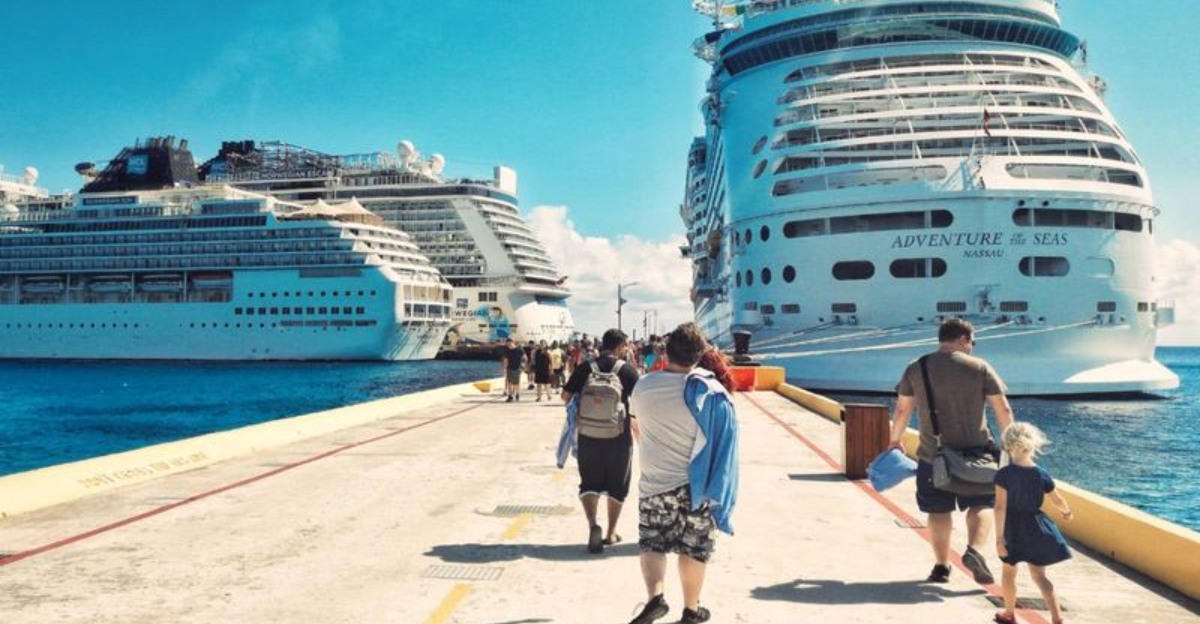
Cruising is all about relaxing, exploring, and indulging—but a smooth voyage isn’t just about where the ship goes. It’s also about how everyone behaves on board. Want to avoid being that passenger? Here’s the deal: seasoned cruisers follow a quiet code that makes life easier (and way more enjoyable) for everyone at sea.
From buffets to balconies, these 14 unwritten rules are the key to keeping good vibes afloat. Plus, I’ll share 3 golden rules that aren’t just helpful—they’re essential. Ever wondered if it’s okay to reserve a deck chair with your towel at 7 a.m.? Or whether skipping the muster drill is a big deal?
I’ve got the answers—and a few insider tips to help you cruise like a pro, not a rookie. Ready to set sail the right way?
1. Don’t reserve loungers and disappear
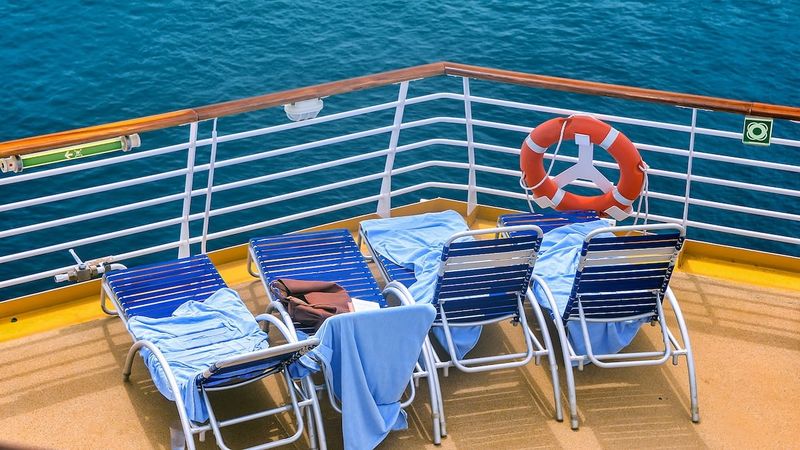
Early morning chair-hogging is perhaps the most infamous cruise ship faux pas. Dropping your towel on a prime poolside lounger at 7 AM then vanishing for hours frustrates fellow passengers who actually want to use the chairs.
Most cruise lines have policies against this practice, with staff removing items from unattended chairs after 30-60 minutes. Be considerate and only claim chairs when you’re actually using them.
If you need a break, ask a nearby passenger to watch your spot for a quick bathroom trip or buffet run, but don’t abuse their kindness with extended absences.
2. Always greet the crew

Cruise ship staff work incredibly hard to ensure your vacation is perfect, often laboring for months without a day off. A simple ‘good morning’ or ‘thank you’ acknowledges their efforts and brightens their day.
These hardworking individuals remember passengers who treat them with respect. Your kindness might lead to extra special service throughout your voyage.
Learning crew members’ names shows genuine appreciation for their service. This small gesture of humanity goes a long way when someone is thousands of miles from home, working tirelessly to make your vacation memorable.
3. Be punctual for excursions
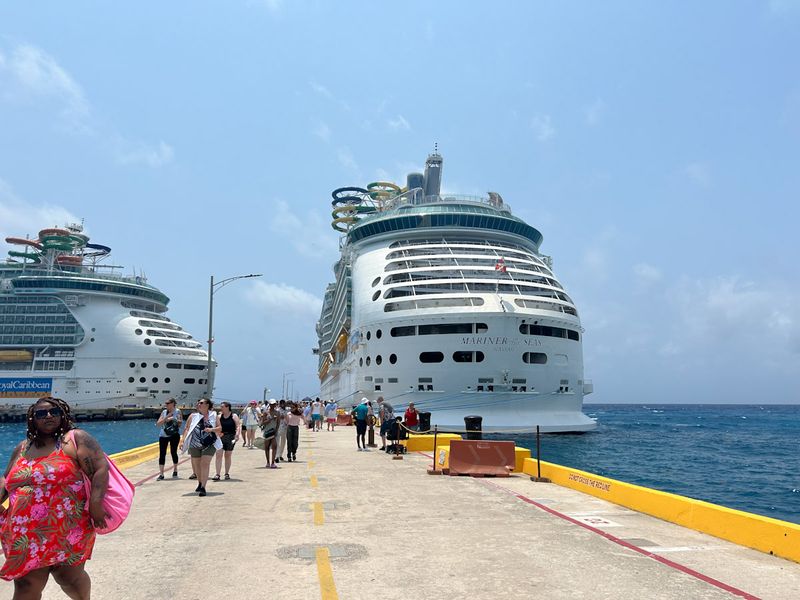
Nothing ruins group harmony faster than being that person who keeps everyone waiting. Shore excursions operate on tight schedules, and tardiness affects everyone’s experience.
Tour guides must balance covering all promised attractions while ensuring on-time return to the ship. When you’re late, the entire group either misses parts of the tour or risks cutting it dangerously close to all-aboard time.
Set multiple alarms if needed and arrive at the meeting point 10-15 minutes early. Remember the cruise director’s common warning: ‘The ship will not wait for late passengers unless they’re on a ship-sponsored excursion.’
4. Dress appropriately for dinner

Formal nights exist for a reason—they maintain the special atmosphere that makes cruise dining memorable. While cruise dress codes have relaxed over the years, certain standards remain.
Most ships prohibit swimwear, tank tops, and flip-flops in main dining rooms. Specialty restaurants often require even nicer attire, with some maintaining strict jacket requirements for men.
Check your cruise line’s dress code before packing. If formal attire isn’t your style, most ships offer casual buffet alternatives on formal nights, allowing everyone to dine comfortably while respecting the ambiance others expect from cruise traditions.
5. Use hand sanitizer often

Hand sanitizer stations aren’t just decorative—they’re your first defense against norovirus and other illnesses that can spread rapidly in confined spaces. Cruise ships are essentially floating cities where thousands share the same surfaces.
Wash your hands thoroughly with soap and water whenever possible, especially before meals and after using restrooms. Use the sanitizer stations positioned at restaurant entrances, near elevators, and in other high-traffic areas.
This simple habit protects not just you but everyone on board. Nobody wants to spend their vacation quarantined in their cabin with stomach issues while the ship sails between beautiful destinations.
6. Respect quiet hours
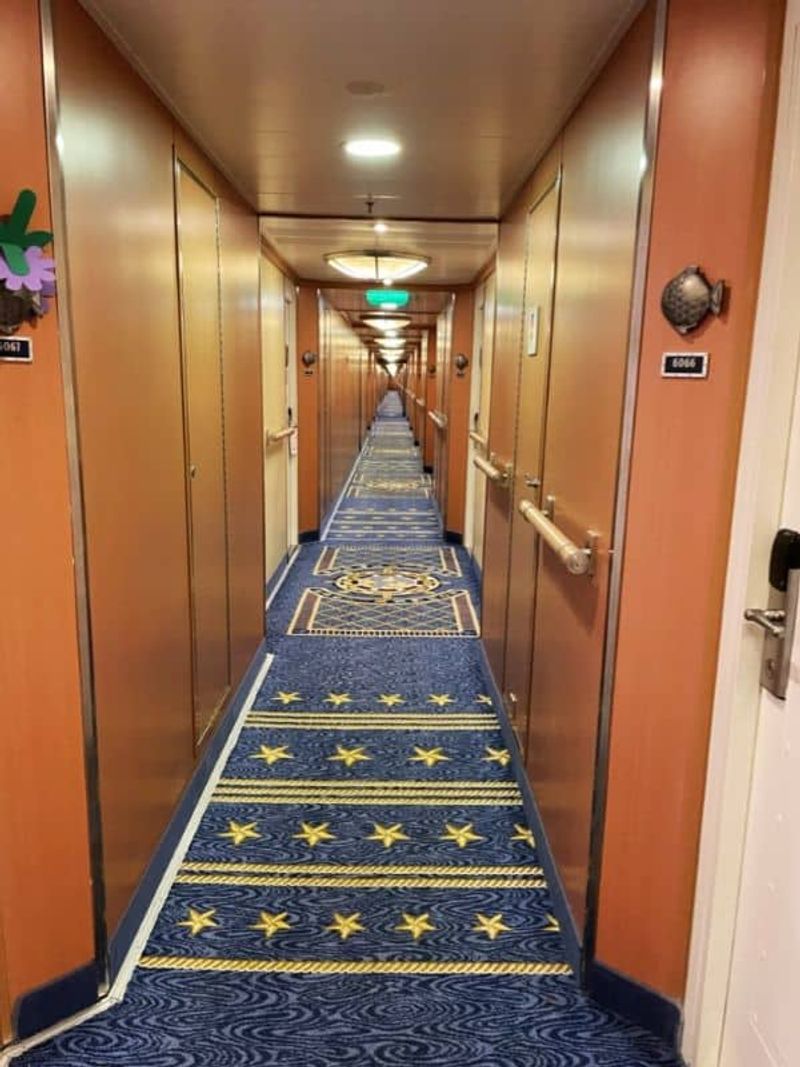
Cabin walls on cruise ships are notoriously thin, turning your late-night conversation or blaring TV into your neighbor’s unwanted alarm clock. Most passengers have busy days planned and need their rest.
Keep voices down in hallways, especially early morning or late evening. Close cabin doors gently rather than letting them slam, and be mindful of the volume on your television or music.
If returning from a late-night party, remember that families with young children or early-rising excursion participants may be sleeping nearby. Your consideration ensures everyone enjoys their vacation on their own terms without unnecessary disturbances.
7. Don’t block hallway traffic
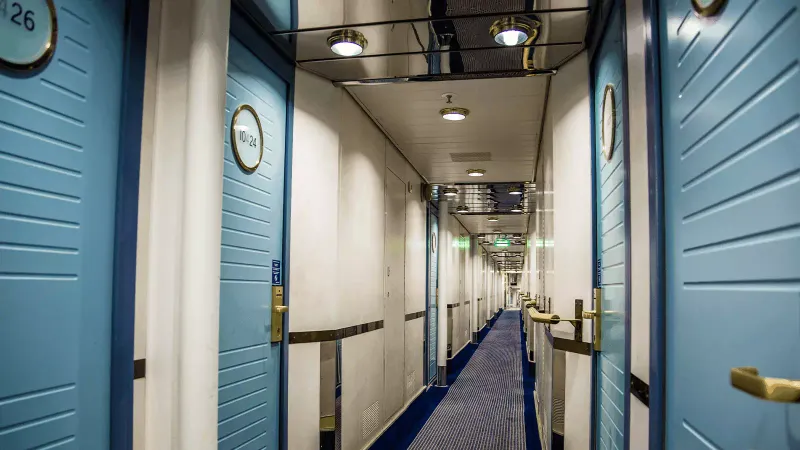
Cruise ship corridors serve thousands of passengers but weren’t designed for impromptu social gatherings. Standing in hallways to chat creates bottlenecks that frustrate other travelers trying to navigate the ship.
Similarly, leaving cabin doors propped open while talking across the hall creates noise disturbances. If you encounter friends, either briefly acknowledge them and continue moving, or suggest relocating to a lounge or public area designed for socializing.
This courtesy extends to elevators too—step aside after exiting to let others pass, and don’t hold elevator doors open for extended conversations when others are waiting to use them.
8. Tip beyond the automatic gratuity

Automatic gratuities streamline the tipping process but aren’t always fairly distributed among all staff who make your vacation special. Many crew members rely heavily on tips to support families back home.
Consider bringing cash to reward exceptional service from bartenders, room stewards, or dining staff who go above and beyond. Even $20-50 extra for your cabin steward can make a meaningful difference in their income.
For bar service, adding a dollar or two beyond the automatic gratuity for each drink order ensures attentive service throughout your cruise. These small gestures acknowledge the hard work of people who often work seven days a week for months at a stretch.
9. Don’t hog the hot tub

Hot tubs are premium real estate on cruise ships, especially on sea days when everyone wants to relax. Monopolizing these spaces for hours prevents others from enjoying this limited amenity.
Cruise etiquette suggests limiting your soak to 20-30 minutes when others are waiting. This gives everyone fair access while still allowing you to enjoy the experience.
Adults should respect age restrictions on certain hot tubs. If some are designated adults-only, don’t bring children into these areas—there are typically family-friendly options elsewhere on the ship where everyone can enjoy the bubbling waters without conflict.
10. Be patient during embarkation and disembarkation
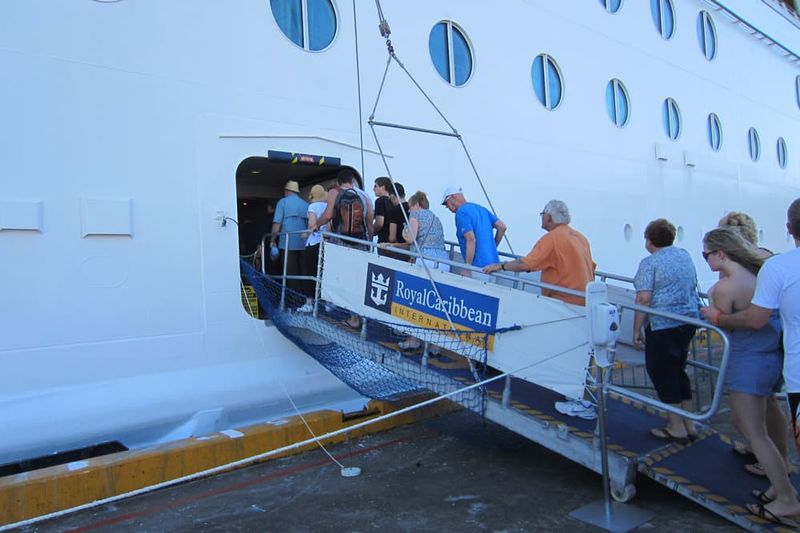
The beginning and end of your cruise involve processing thousands of passengers, their luggage, and various security requirements. Frustration and impatience only make these necessary procedures more unpleasant for everyone involved.
Follow crew instructions during these transitions. When boarding, have documents ready and organized before reaching the check-in counter. During disembarkation, wait for your assigned group to be called rather than crowding gangways prematurely.
Remember that port staff and ship crew are coordinating a massive logistical operation. Your patience and cooperation help everything run more smoothly and start your vacation—or your journey home—on a positive note.
11. Follow muster drill instructions

Safety drills might seem tedious, especially when you’re eager to start your vacation, but they’re legally required and potentially life-saving. Pay attention to emergency procedures instead of chatting or scrolling through your phone.
Newer ships often offer electronic muster drills where you can complete safety training on your own schedule. Take these seriously and actually watch the demonstrations rather than just checking them off.
Knowing the location of your muster station, how to properly wear a life jacket, and understanding emergency signals could make a critical difference in an actual emergency. The few minutes invested in safety awareness is minimal compared to the importance of the information.
12. Keep your balcony behavior respectful
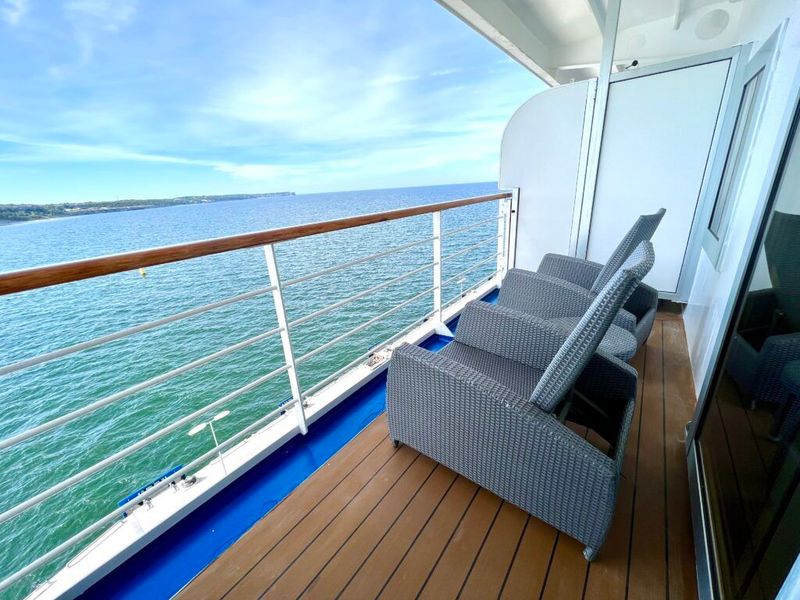
Private balconies feel secluded but are actually quite exposed to neighboring cabins. Sound carries surprisingly well over these outdoor spaces, making loud conversations easily overheard by those trying to enjoy their own peaceful retreat.
Smoking is typically prohibited on balconies due to fire hazards and consideration for other passengers. Similarly, tossing items overboard is both environmentally harmful and dangerous for those on lower decks.
Proper balcony etiquette also means dressing appropriately, as neighboring cabins and public areas of the ship may have direct sightlines to your outdoor space. What feels private often isn’t as secluded as you might think.
13. Use headphones in public areas

Not everyone shares your taste in music, movies, or game sound effects. Playing audio from phones, tablets, or laptops without headphones forces everyone nearby to become an unwilling audience to your entertainment choices.
This courtesy applies throughout the ship—by the pool, in lounges, and especially in quieter areas like the library or observation decks where people seek peaceful environments. Even in your cabin, remember that TVs and music can be heard through walls.
Pack headphones for everyone in your travel party, including children. This simple preparation allows everyone to enjoy their preferred entertainment without creating noise pollution that diminishes others’ cruise experience.
14. Don’t overdo it at the buffet

Endless food options tempt passengers to pile plates sky-high, but excessive food waste is both environmentally irresponsible and costly for cruise lines. Take smaller portions initially—you can always return for seconds if you’re still hungry.
Wait your turn in buffet lines rather than reaching across other diners or cutting in line. Use the provided serving utensils rather than your personal silverware, and always use a clean plate when returning for more food.
If traveling with children, help them navigate the buffet to prevent messes and wasted food. Teaching kids proper buffet etiquette early makes for more pleasant dining experiences for everyone sharing the space.
15. Attend the muster drill (make or break)

Skipping the mandatory safety drill isn’t just poor etiquette—it could get you kicked off the ship before it even sails. Cruise lines take these drills seriously because maritime law requires all passengers to participate.
Staff take attendance at muster stations, and those absent may be paged repeatedly throughout the ship. Continued absence could result in a security search and potential disembarkation at your expense.
This non-negotiable safety requirement typically takes just 15-30 minutes of your vacation. Show up on time, listen attentively, and save the socializing for after the drill. Your cooperation ensures the ship can depart on schedule and everyone starts their vacation positively.
16. Return to ship on time (make or break)
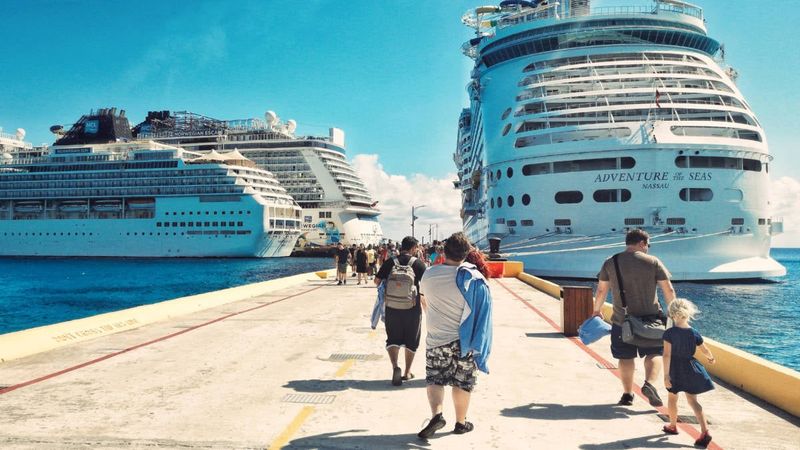
The famous saying in cruising—’the ship waits for no one’—is absolutely true unless you’re on a cruise-line-sponsored excursion. Ships operate on strict schedules coordinating with port authorities, pilot services, and future port calls.
Always wear a watch synchronized with ship time, which may differ from local time in port. Plan to return at least 30 minutes before the all-aboard time to account for unexpected delays like traffic, long taxi lines, or crowded security checkpoints.
Missing the ship means arranging your own transportation to the next port at considerable expense, plus the hassle of retrieving your passport from the ship. This easily avoidable disaster can ruin your vacation and budget.
17. Follow health and safety protocols (make or break)
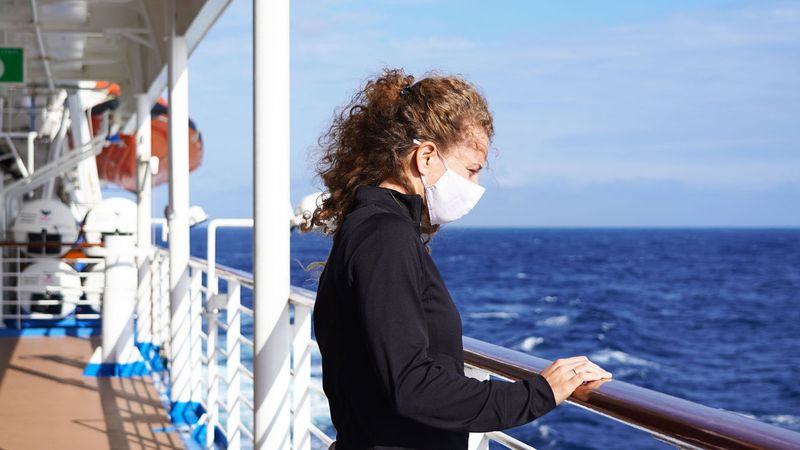
Post-pandemic cruising introduced enhanced health protocols that remain important for preventing illness outbreaks. Washing hands frequently, using sanitizer stations, and following any mask requirements in certain areas aren’t just suggestions—they’re crucial safeguards.
Honesty on health questionnaires is mandatory. Concealing symptoms to board could spread illness throughout the ship, potentially affecting thousands and leading to quarantines or canceled port calls.
Cruise lines reserve the right to disembark passengers who repeatedly violate health protocols. Such removal comes at your expense with no refund. Your cooperation with these measures protects everyone on board and ensures the cruise can complete its planned itinerary.
